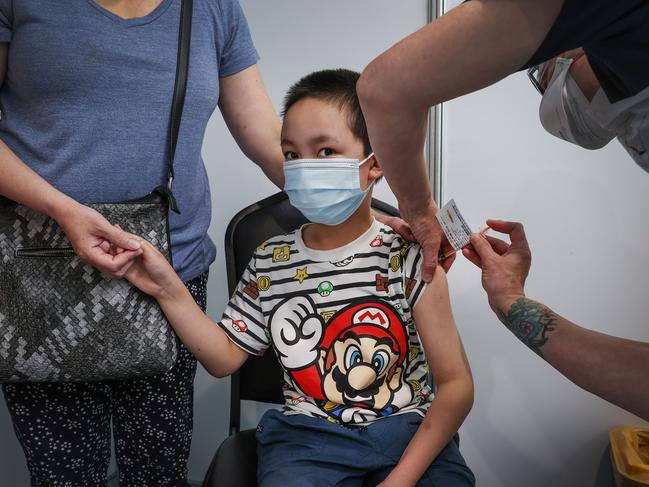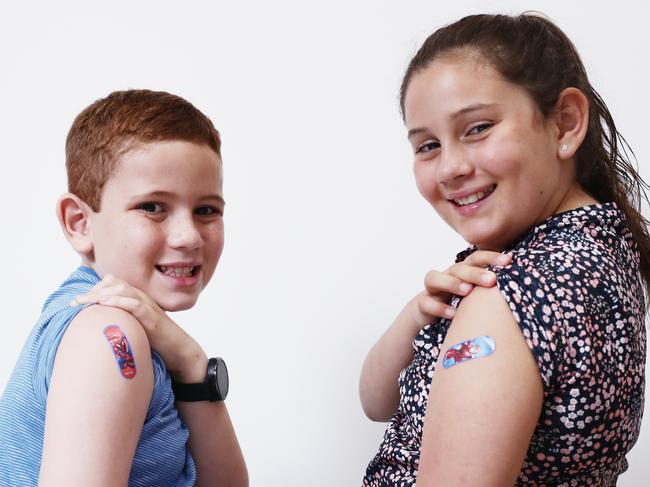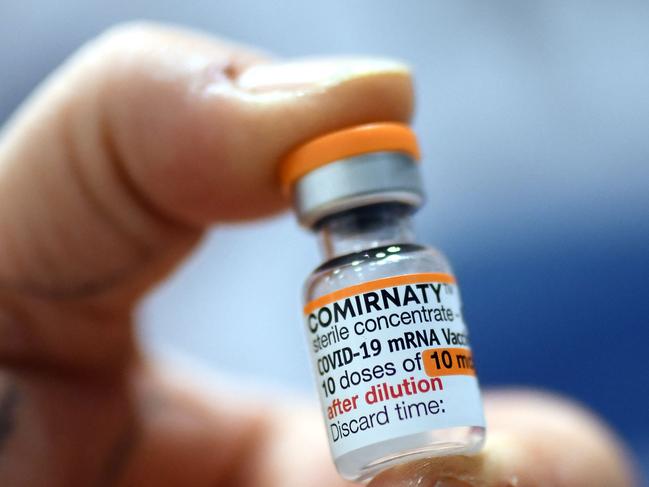Covid-19 Australia: How to handle awkward child vaccine conversations
As the Covid-19 vaccine rollout for kids aged 5 to 11 continues, parents may face tricky dilemmas at home and school. An expert looks at some of the biggest issues.
Coronavirus
Don't miss out on the headlines from Coronavirus. Followed categories will be added to My News.
Australian children aged between 5 and 11 now have access to the Pfizer jab, with the Morrison government urging parents to get their children vaccinated ahead of the new school year.
As the rollout continues, parents may find themselves encountering unprecedented issues such as how to navigate playdates with unvaccinated kids and how to talk to children about their jab concerns.

Claire Hooker, senior lecturer in health and medical humanities at the University of Sydney, answers some of the big questions parents may be facing.
What can vaccinated parents do if they know they will come across unvaccinated parents who will not be vaccinating their kids?
CH: Wholly unvaccinated families represent the highest level of risk in transmitting Covid at present. It is reasonable for parents to prefer to limit contact with these families during the current surge in cases of the highly infectious Omicron variant.
However the best way to do this, is to convey respect to the other family — even if you feel that someone’s decision not to vaccinate is disrespectful to the community. Responding to disrespectful behaviour by being disrespectful, does not improve a situation.
As always, we know what doesn’t work: and that is criticising other parents and making them feel defensive. The more defensive people feel, the less likely they are to change their mind.
The best way forward is always to be polite and to focus on your own boundaries.
Parents should get clear about what risks they feel comfortable about taking for themselves.
Some parents are worried about their kids getting Covid. Other parents are worried about their kids bringing Covid home and infecting an elderly or otherwise immunocompromised or vulnerable family member. These parents may prefer to only have shorter playdates with unvaccinated families outside, or while wearing N95 masks.
Or you may prefer to postpone playdates with unvaccinated families altogether, until the present wave of Omicron variant infections has subsided and the risk of infection is lower. Parents can politely explain that for the moment, they are preferring to limit their exposure to Covid and that avoiding interactions inside is what is right for their family at this time.
When schools re-open, vaccinated and unvaccinated children, from vaccinated and unvaccinated families, will be mixing in classrooms and playgrounds. When that is the case, it will be less reasonable to suggest that your child avoids an unvaccinated child from an unvaccinated family outside school hours, if they are already interacting with that child in school.
What about vaccinated parents who won’t vaccinate their kids? How do the vaccinated talk to them?
CH: Parents who want to be helpful can show their support for vaccinated parents who are hesitant about vaccinating their kids, by being good, non judgmental listeners. It is very understanding for parents to have questions about a new vaccine.
Mums and dads may have heard worrying information about possible side effects. Possibly they may have heard about reported risk of myocarditis, an inflammation of heart, which occurred in a very small number of adolescents (mainly boys) who received mRNA Covid vaccines such as Pfizer.
Parents may also have been exposed to misinformation about the dangers of vaccination.

If parents have already been vaccinated, then they are probably trying their best to make good decisions amid the uncertainty of the pandemic, and they need support, not criticism. Rather than giving advice, the most helpful thing to do is to be understanding and to listen.
Often giving people the time and space to talk through their concerns, is the best way to allow them to resolve their problems for themselves. Be curious, ask questions, and try not to give answers. You can come prepared with high quality resources from reputable sources that your parent friends can use to help them make their decisions, such as those produced by the National Centre for Immunisation Research and Surveillance.
What if they have awkward situations where there are play dates and school outings at stake? How can parents navigate this?
CH: It’s so hard to have these awkward pandemic conversations, especially when people are so weary and under so much stress.
The best way forward is to be clear about your own boundaries and rules, but to express these with politeness, respect and without judgment of other parents’ actions.
You can try phrases such as ‘Thanks for understanding that we are not comfortable with having playdates yet’, or ‘We’ve decided that it’s not right for our family to take many risks about Covid right now’ or ‘I know it’s a bit hard for the kids, and I don’t want them to lose their friendship, but we’re staying cautious for a while yet’.
Finding common ground or shared values is a good way to keep the peace and maintain connections while remaining Covid-safe. You might say ‘I agree with you that it is important to question the reliability of medications, especially if they are given to a whole population.

But just at the moment, vaccination is important to me – we will be very happy to consider playdates when the Covid risk is less.’
If the vaccination status of other families is important to you, simply state ‘It feels awkward and maybe rude to ask, but our family is quite concerned about Covid risks, so we are all fully vaccinated - may I ask if you and your kids are vaccinated also?’ or ‘I don’t want to judge anyone else’s choices, but because we are concerned about Covid risks, I do need to ask you about whether you’ve been vaccinated – thanks so much for understanding.’
What advice is there for parents whose kids might get bullied in the playground because of their vax or non-vax status?
CH: We all really needs to agree on this one. Bullying is unacceptable no matter what the circumstances. Schools will need to be on board to make it clear to parents and kids alike that no child should comment unkindly on another child’s vaccination status. Children don’t make vaccination decisions and should not be regarded as responsible for them. You can ask your child if they need some help talking to a friend who is not vaccinated – maybe suggest that they ask their friend how they feel about being vaccinated or unvaccinated, and if they are worried about anything. Explain that a good friend is able to listen without criticising.
Is it fair to ask why a child is not getting vaccinated?
CH: This question is only going to be helpful if you already have a good relationship with the other parents involved. If the parents are your friends, you might ask out of curiosity. The great thing about curiosity is that, if genuine, it does not convey a judgment, and avoids making people defensive. If you do ask, be ready to listen and to be supportive.
People don’t want to trust you with their worries, if all you are going to do is given them your opinion, or tell them why they are wrong. You might learn that they have very understandable reasons for their concerns – perhaps a health condition that you didn’t know about, or a frightening experience in the past, or family pressures that they are having trouble navigating. It could be that your kind understanding gives them the support they need to make their decisions.
What if they just don’t believe in vaccinating their kids at all? And this could mean the end of a friendship?
CH: It’s so hard to remain friends with people that you disagree with. I remind myself that I want to live in a society where people do question things and have different opinions – our different perspectives is our strength, even though it often feels like just the opposite! Agreeing to disagree while allowing your kids to remain friends is the best outcome, if you can manage it.
We should remember that people who are opposed to vaccination are actually very rare – perhaps 2 per cent of Australians. The overwhelming majority of adult Australians eventually did get their Covid vaccinations.
Even though 30 per cent of us were worried about Covid vaccines and said they were unlikely to vaccinate, over time, almost eventually everyone overcame their worries and got their jab. So bear in mind that if you wait long enough, people do often get the courage to change their decisions.
In the next month, unvaccinated and vaccinated kids will be mixing at school. So if your kids have an important friendship, you can continue to allow them to play together, perhaps outside if you prefer, even if you disagree with their parents.
If you really can’t tolerate another parent’s decisions, then you will need to explain your decision very politely to your child, and make it about you, not them: ‘I’m sorry, I’m sure they are lovely people, but I just cant manage to be friends when we disagree about this topic, at least not right now’.
What about kids who are concerned about getting vaccinated? What can parents do to reassure them?
CH: No one in the world likes a needle. The first thing that parents can do is to be empathetic and to connect, perhaps confessing that you, too, were a bit scared before your own jab. Ask your kids if they are worried about anything or have heard anything about the vaccines. Don’t laugh at their concerns – provide them with information if they want it.





